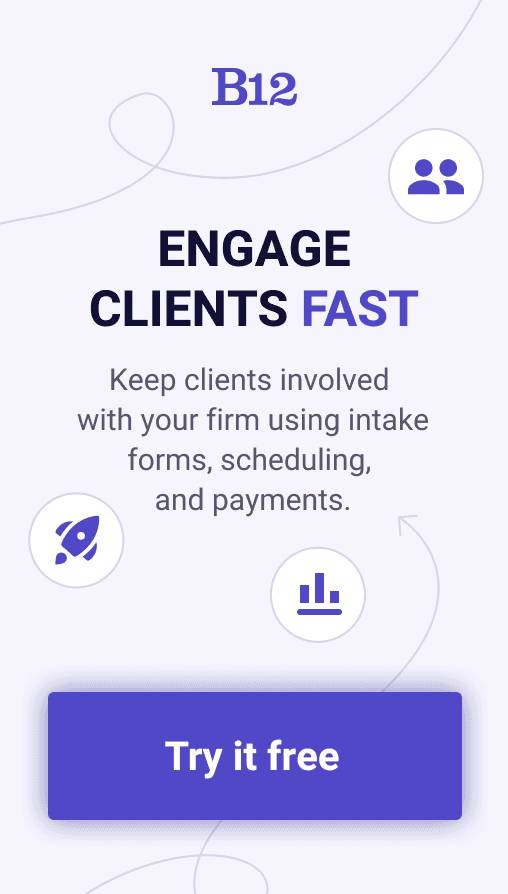Build an AI website in 60 seconds
AI generates your personalized website instantly with built-in scheduling, payments, email marketing, and more.
Start for free
How to get started as an independent consultant

Are you considering taking the leap and becoming an independent consultant? You're not alone! Many professionals build up the skills and confidence to take the leap and start their own companies. But no matter how knowledgeable you are in your field, it's intimidating to go out on your own and find your first client.
To help you start your consultancy, we'll go through the key elements of becoming a successful independent consultant, from assessing your skills and identifying areas of expertise to crafting your pitch and understanding your market. We'll also discuss how to establish your business structure and obtain necessary permits, create a dependable network of clients and referral sources, and optimize your online presence to attract quality leads. Let's get started!
How to get started as an independent consultant
Working as an independent consultant can be a gratifying and flexible job. You get to be your own boss, make your own hours, and decide who you work with and what projects you take on. However, becoming an independent consultant isn’t easy and requires a lot of hard work and dedication. Before diving into this career, it's essential to understand the basics and key elements of the job.
First, you should assess your skills and areas of expertise. You need to understand what services you can offer to clients and how you can provide value to them. You also need to figure out what industry you want to focus on. Having a deep understanding of the industry and its players will be essential to your success.
After you’ve identified your skills and area of expertise, you will need to decide on a business structure. This could be a sole proprietorship, LLC, or S-corp. Depending on the type of business structure you choose, you may also need to get certain permits and licenses.
Lastly, you need to create a plan for how you will market and promote your services. Building a network of clients and referral sources is essential for success as an independent consultant. Reach out to potential clients, get referrals from other professionals, and create a pitch that explains how you can provide value. Once you have a plan in place, you can start to create an online presence to advertise your services and attract quality leads.
Assessing your skills and identifying areas of expertise
As an independent consultant, the first step is to assess your skills and identify areas of expertise. Ask yourself what you are most passionate about, what sets you apart from other consultants, and what value you can bring to clients. List your knowledge, skills, and experience, and consider how these can be used to provide solutions for various industries. Assessing your skills and identifying areas of expertise will help you focus on a specialized service you can offer potential clients.
Do your research and look into current trends in your chosen field of expertise. What do people need help with? What challenges are they facing? This research will give you valuable insight into the type of services you can offer. Additionally, it is beneficial to seek professional advice from an experienced consultant in your chosen field. They can provide valuable insight into the current market and help you develop an effective strategy for your business.
It is also important to understand the different types of consulting services you can offer. For example, you may want to focus on providing strategic advice, project management, or training services. By understanding the different services you can offer, you will be better equipped to determine the scope of your business. Additionally, you will be able to provide clients with a clear overview of the services you offer and how they can benefit from them.
Additionally, take the time to develop a plan of action for how you will approach each project. This plan should include the steps you want to take, the timeline for each project, and the resources you will need to complete it. Having a plan in place will make it easier for you to manage your time and resources, ensuring that you deliver a quality service to your clients.
Establishing your business structure and obtaining necessary permits
Being an independent consultant is a great way to be your own boss and take control of your career. Before you can start capitalizing on the opportunities that come with this freedom, however, you need to establish a business structure and obtain the necessary permits. This can be a daunting task, but with the right approach, it can be a straightforward process.
The first step is to choose the right business structure for you. The most popular options are sole proprietorship, partnership, limited liability company (LLC), and corporation. Each structure has its advantages and drawbacks, so research and choose the one that best meets your needs.
Once you've chosen your business structure, you'll need to obtain the necessary permits and licenses. Depending on your industry and location, you may also need to meet certain legal requirements, such as obtaining a business license or registering with the local government. It's important to do your research and understand the regulations in your area to ensure compliance.
You'll need to set up a business bank account to manage your finances. This is important for tracking your expenses, keeping accurate records, and filing taxes. Shop around and compare fees, interest rates, and other offers to get the best deal.
By taking the time to establish your business structure and obtain the necessary permits, you can ensure that your business is compliant and ready to start making money.
Creating a dependable network of clients and referral sources
Working as an independent consultant requires the development of a dependable client base. Without a steady stream of clients, it will be difficult to sustain a profitable consulting business. To create a dependable network of clients, it is important to first identify the types of clients you are looking for and the industries in which you specialize. You should also consider joining professional organizations and attending events related to your area of expertise. Additionally, consider reaching out to other professionals in the industry, such as other consultants or business owners. These individuals can provide valuable information about the industry and may even be interested in utilizing your services.
After identifying potential clients, it is important to reach out and make contact. Consider sending out emails or making phone calls to potential leads. When making contact, it is important to make a good impression. Be professional, personable, and make sure to explain the value of your services. Additionally, consider offering incentives, such as discounts or free consultations, to entice potential clients.
When establishing a network of clients, it is also important to consider referral sources. Referrals are an excellent way to build your business and acquire new clients. Ask past clients to refer you to their contacts, and consider offering an incentive, such as a discount, for successful referrals. Additionally, consider reaching out to other professionals who may be able to refer you to potential clients.
Plus, it is important to cultivate relationships with clients, referral sources, and other professionals. Make sure to stay in touch with your network, and consider offering discounts or incentives for repeat business. Additionally, make sure to thank your clients for their business and to ask for feedback. This will help to ensure that you are providing quality services and that clients are satisfied with your work.
Crafting your pitch and understanding your market
Working as an independent consultant requires entrepreneurs to be able to craft a persuasive pitch that demonstrates their value to potential clients. To be successful, consultants should understand the needs of their target market and be able to customize their services to meet those needs. It is also important to research the market and learn the competitive landscape to ensure they can differentiate their offerings and stand out from the competition.
Creating an effective pitch involves more than simply listing your services and features. Consultants should be able to articulate the unique benefits they offer, such as cost savings, faster implementation times, or higher quality control standards. Additionally, they should be able to clearly explain how their services will help the client solve their problems or improve their operations. Consultants should also emphasize their credentials, experience, and qualifications, as well as any successes they’ve had in their career.
When creating a pitch, it is important to tailor it to the specific client and industry. For example, a consultant looking to work with a financial services company should focus on their experience in the financial industry, while a consultant looking to work with a technology company should focus on their experience in the tech industry. Additionally, consultants should be prepared to answer any questions the client may have about their services, as well as their past experiences.
Consultants should also be prepared to negotiate payment terms. It is important to have a clear understanding of the client’s budget and be prepared to discuss different payment options. Consultants should also be aware of their own value and the market rate for their services and be prepared to negotiate a fair fee for their services.
Optimizing your online presence to attract quality leads
Working as an independent consultant, it’s essential to make sure that your online presence is optimized to attract quality leads. With the right strategy, you can use the Internet to promote your services and build your business. A few important steps to consider include setting up a website, creating a social media presence, and using targeted advertising to reach potential clients.
An up-to-date website with engaging content and simple, user-friendly navigation is key. Your website should clearly communicate your services, provide potential clients with a way to contact you, and include any relevant certifications or credentials. In addition, having an active, professional profile on social media sites like LinkedIn, Twitter, and Facebook can help you to connect with potential clients.
Targeted advertising is another great way to reach potential clients. Ads on search engine sites like Google, as well as in-app ads on social media platforms, can be an effective way to increase your visibility. You can also consider paid campaigns on industry-specific websites and publications.
Launch your professional consulting website with B12
By optimizing your online presence, you can ensure that you’re reaching the right people and increasing your chances of attracting quality leads. Remember, having a well-thought-out strategy is essential to success. Take the time to research your target market and come up with a plan that works for you. With the right online presence, you can maximize your reach and ensure you’re attracting the right clients.
B12 is an all-in-one platform for professional services. Attract leads, win business, and serve clients online with a professional site, scheduling, payments, intake, and more. Build your free site.
Attract, win, and serve more clients
Receive helpful resources directly to your inbox to help you succeed online.
Draft your site in 60 seconds
Get an AI website made specifically for you that's free to launch.
Start for free ✨No credit card required
Spend less time on your website and more time growing your business
Let B12 set up your professional online presence with everything you need to attract, win, and serve clients.




